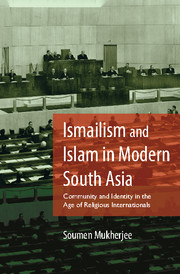 Ismailism and Islam in Modern South Asia
Ismailism and Islam in Modern South Asia Book contents
- Frontmatter
- Contents
- Acknowledgements
- List of Abbreviations
- Glossary
- Note on Transliteration
- Introduction
- 1 The Khoja Ismailis and Legal Polemics Religion and Customs in Nineteenth Century Bombay
- 2 The Howardian Moment Morality, Aryanism and Scholarship
- 3 Pan-Islamism and an Asiatic Spirit Postnational Subjectivities in an Age of ‘Transition’
- 4 The Hazir Imam, Ismailism and Islam in Late Colonial South Asia
- 5 The Importance of Being Ismaili Religious Normativity and the Ismaili International in the Age of Global Assemblages
- Concluding Reflections
- Select Bibliography
- Index
Concluding Reflections
Published online by Cambridge University Press: 23 July 2017
- Frontmatter
- Contents
- Acknowledgements
- List of Abbreviations
- Glossary
- Note on Transliteration
- Introduction
- 1 The Khoja Ismailis and Legal Polemics Religion and Customs in Nineteenth Century Bombay
- 2 The Howardian Moment Morality, Aryanism and Scholarship
- 3 Pan-Islamism and an Asiatic Spirit Postnational Subjectivities in an Age of ‘Transition’
- 4 The Hazir Imam, Ismailism and Islam in Late Colonial South Asia
- 5 The Importance of Being Ismaili Religious Normativity and the Ismaili International in the Age of Global Assemblages
- Concluding Reflections
- Select Bibliography
- Index
Summary
… Abraham, Moses, Jesus, and all the Prophets of Israel, are universally accepted by Islam. Muslims indeed know no limitation merely to the Prophets of Israel; they are ready to admit that there were similar Divinely-inspired messengers in other countries—Gautama Buddha, Shri Krishna, and Shri Ram in India, Socrates in Greece, the wise men of China, and many other sages and saints among peoples and civilizations of which we have now lost trace … Then what need was there for a Divine revelation to Mohammed? … In spite of its great spiritual strength, Jewish monotheism has retained two characteristics which render it essentially different from Islamic monotheism; God has remained, in spite of all, a national and racial God for the children of Israel, and his personality is entirely separate from its supreme manifestation, the Universe.
In far distant countries such as India and China, the purity of the Faith in the one God had been … vitiated by polytheism, by idolatry, and even by pantheism … Christianity lost its strength and meaning for Muslims in that it saw its great and glorious founder not as a man but as God incarnate in man … Thus there was an absolute need for the Divine Word's revelation, to Mohammed himself, a man like the others, of God's person and of his relations to the Universe which he had created … Islam's basic principle can only be defined as monorealism and not as monotheism.
His Highness Aga Khan III, 1954; emphases mineThis book sought to explore the evolution of a Shia Ismaili identity in modern South Asia and trace the genealogies of conceptual categories and institutions that conditioned the historical process. Drawing upon a corpus of neglected primary sources, it shed light on an array of larger questions, such as, complexities of Muslim societies in colonial South Asia, the development and articulation of denominational identities, the politics of production-dissemination-reception of religio-legal knowledge, and not least both appropriations and critiques of western epistemic categories by indigenous religious elites. The quotation in the epigraph above illustrates some of the complexities that had come to exert a riveting force on religious leaders, thinkers, and intellectual elites across the world since the late nineteenth century.
- Type
- Chapter
- Information
- Ismailism and Islam in Modern South AsiaCommunity and Identity in the Age of Religious Internationals, pp. 173 - 180Publisher: Cambridge University PressPrint publication year: 2016


